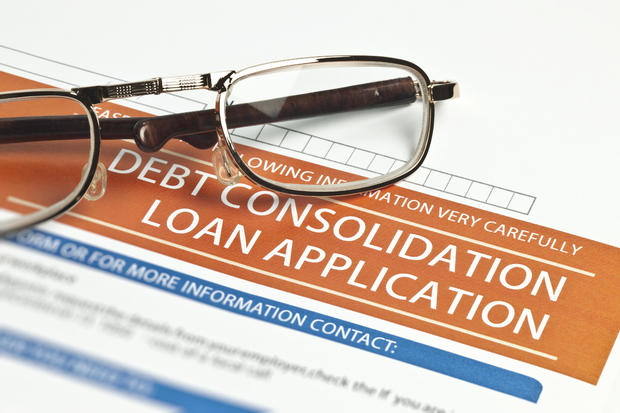What is debt consolidation, and how does it work?
If you have mounting debt, you're likely not alone. According to recent data from Experian, Americans had an average debt balance of $96,371 in 2021 - a 3.9% spike from the prior year. This figure includes credit card debt, loans and other types of debt.
One method is debt consolidation, which allows you to combine multiple debt balances into a single account, ideally with a lower interest rate. That way, you can potentially save money on interest, lower your monthly payments and pay off your debt faster.
If you're feeling overwhelmed by debt, now is a good time to take steps to pay it down quickly. See how much you could potentially save by consolidating your debt now!
Let's take a closer look at debt consolidation, how it works and how it can help you save money.
What is debt consolidation?
Debt consolidation provides a simple way to tackle debt by rolling multiple debt accounts into a single account, typically a consolidation loan. You can consolidate student loans, credit card debt, unsecured personal loans and other accounts.
Not sure if debt consolidation is right for you? Here's a breakdown of the different reasons you might want to consider consolidating your debt:
- Simplify your finances: The average cardholder has four credit cards, according to Debt.org. Debt consolidation makes managing your finances easier by replacing multiple debt accounts with one account, interest rate and monthly payment.
- Lower your interest rate: Data from the Federal Reserve shows the average credit card interest rate in 2022 is roughly 16%. However, cardholders with substantial debt could pay 20% to 30% interest or more. By contrast, interest on a debt consolidation loan ranges between 6% and 20% depending on your credit, Debt.org reports. With a reliable income and a good credit score, you may be eligible for a consolidation loan with a reduced interest rate, which could lower your monthly payment and reduce your payoff time.
- Accelerate your payoff schedule: If you qualify, debt consolidation could cut your interest rates while potentially trimming several months off your repayment schedule.
If you're drowning in debt, you may want to check if you qualify for a debt relief program to help get you back on track.
If you're not sure what range your credit score falls within, consider filling out an online form - after all, a good or excellent credit score can make a significant difference for you financially. If you're stuck in the poor or fair range, there are some steps you can take to improve your score.
How does debt consolidation work?
Typically, when you consolidate your debt, you get one big loan covering all your combined debt from your other loans and credit card debt. As a result, you only have to make one payment instead of multiple. Sounds simple, right?
Keep in mind that debt consolidation loans may come with higher interest rates, extra fees and longer repayment terms. Before you sign for a debt consolidation loan, review the terms of the loan to make sure you'll save money in the long run.
Getting a debt consolidation loan typically involves the following steps:
- Shop several lenders to make sure you're getting the lowest interest rate possible.
- Fill out a loan application.
- Provide any additional documents the lender requests to verify your income, banking accounts and other information.
- The lender will evaluate your application, credit report and supporting documents.
- The lender will approve or reject your loan application.
- If approved, the lender may pay off your debt accounts for you. Sometimes, the lender may fund your bank account or issue you a line of credit and you pay off your accounts yourself.
Common types of debt consolidation
While there are many ways to consolidate your debt, the most common way is to take out a debt consolidation loan to pay off your balances or utilize a balance transfer credit card.
Debt consolidation loan
A debt consolidation loan is a fixed-rate installment loan where you repay the loan with monthly payments over a set term. To qualify for a debt consolidation loan, you must have a steady income and at least decent credit. To get the lowest interest rate, a credit score of 740 and above may be required.
Balance transfer credit card
With good credit, you may qualify for a balance transfer credit card offering a 0% interest introductory period, ranging anywhere from 12 to 21 months, Experian notes. You can transfer all your debts onto this card and pay off your balance during the introductory period interest-free.
Remember, however, that once the introductory period expires, the regular annual percentage rate (APR) applies. Also bear in mind, that these credit cards come with a balance transfer fee, usually ranging from 3% to 5% of the transfer amount with a minimum fee of $5. If you only have a small amount of debt to transfer, the savings you'll receive may not exceed the balance transfer fee.
Other consolidation alternatives
While debt consolidation loans and balance transfer credit cards are commonly used to tackle debt, other consolidation options are available, each with varying degrees of risk to consider.
- Personal loan: Unlike debt consolidation loans, whose primary function is to pay off your debt, personal loans aren't tied to a single purpose. You can use the funds from a personal loan for various reasons.
- Home equity loans: If you have sufficient equity in your home, you can access that equity to pay off debt through a home equity loan or a home equity line of credit (HELOC). Home equity loans typically offer lower interest rates than other options, but that's likely because your house serves as collateral on the loan. A home equity loan is risky because if you default on the loan, you could lose your home.
- 401(k) loan: It may be tempting to withdraw funds from your retirement plan - mainly because you likely won't have to pass a credit check - but that could be classified as an early withdrawal and trigger taxes and penalties. A 401(k) loan may be a better option because you can avoid the tax penalty. Consult with your plan administrator before taking money from your retirement plan or reach out to a financial consultant for advice.
- Debt management plan: You may set up a debt management plan by working with a nonprofit credit counseling agency. In this case, a credit counselor contacts your credit card companies and attempts to negotiate lower interest rates and monthly payments, typically from three to five years.
- Debt settlement plan: You should only consider a debt settlement plan as a last resort. A debt settlement plan is different from a debt consolidation loan because a debt relief company negotiates with your creditors to lower your debts for less than what you owe, rather than moving your debts to one account. These companies often charge a hefty fee for their service. Debt settlement plans are risky because they can seriously harm your credit, and you could owe taxes since any forgiven debt is considered taxable income.
Debt consolidation may make sense if it helps you simplify your finances and comes with a lower interest rate that can save you money. Just remember to review the interest rate, terms and fees before accepting any loan or credit solution.
Additional ways to free up cash
If the above options don't sound beneficial and you still need money to pay down debt, there are some other traditional alternatives to explore. However, each is specific to your individual circumstances and, in some cases, the current rate environment. But, if you need to pay down debt quickly, these may be helpful ways to do so.
Refinancing: While the rate environment is not as favorable as it once was for mortgage refinancing, it may still be beneficial for you, particularly if the initial rate you were given for some financial products was prohibitive. Explore your mortgage refinance and student loan refinance options now to see if the numbers make sense.
Reverse mortgages: For select homeowners (age 62 and above) a reverse mortgage will help free up equity in their home. That can then be used to pay down debt, make house repairs and more. The benefits of a reverse mortgage are multiple.
Life insurance: If you have a policy that allows for it, you may be able to tap into your account for cash. See what kind of life insurance you qualify for, and the funds you can potentially access, by reviewing your options today.




